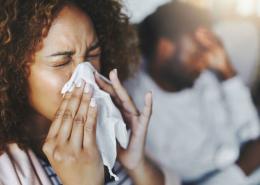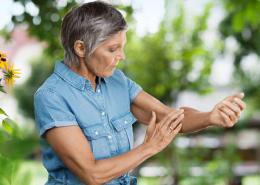Can You Strengthen Your Immune System?

Is a strong immune system the solution to sickness? Can we keep ourselves well by strengthening our immune response?
Sort of. And not really.
Think of your immune system as a home security system for your body. Intact skin and mucus membranes keep out some bacteria and viruses, just as a fence around your house keeps most unwanted intruders off your property. When germs get inside the body, the immune system jumps into action and begins cranking out antibodies and delivering white blood cells to the site of infection, like a home alarm system that blares out a warning as soon as the perimeter of your home is breached — assuming your alarm system can also spontaneously create and spring Home Alone-style traps on any would-be burglars.
If you want to beef up security around your home, it makes sense to strengthen your alarm system. But if you strengthen it too much — program it to respond every time a door is opened, for instance — your security system might call the cops on you the next time you bring home the groceries.
Our immune systems are the same. Though we all want strong, robust immune systems, “boosting” or “strengthening” the immune system isn’t particularly desirable. In fact, autoimmune diseases such as lupus and rheumatoid arthritis occur when the immune system over-reacts and attacks healthy tissue in the body.1 Just as you don’t necessarily need a stronger home security system, but a smarter one, your body needs a healthy, well-balanced immune system — and there’s a lot you can do to optimize your immune system’s performance.
Exercise and Immunity
Regular physical activity may decrease infections and illness. According to U.S. National Library of Medicine, “physical activity may help flush bacteria out of the lungs and airways.”2 Scientific studies have also shown increased immune activity after bouts of moderate-to-vigorous aerobic exercise lasting less than 60 minutes.3 One study of 1002 adults found that individuals who exercised an average of five or more days per week experienced 43% fewer days with cold symptoms than individuals who were largely sedentary.4
Extreme, intense, and prolonged exercise — such as training for elite competition – stresses the body and may conversely lead to immune system dysfunction.5 For optimal immunity, aim for moderate physical activity of an hour or less on most days of the week.
Nutrition and the Immune System
Our immune systems require certain vitamins and nutrients to function well. Without adequate amounts of these nutrients, the immune system can’t operate at peak performance. In fact, micronutrient deficiencies, or deficiencies of zinc, selenium, copper, folic acid, and vitamins A, B6, C and E — may explain why the elderly are more susceptible to disease and illness.6
However, popping supplements is not the answer. It’s better to get your nutrients from fresh, unprocessed foods.7 A high-fiber diet the contains plenty of fruits, vegetable, proteins, and whole grains supports immune health.8 Probiotic and prebiotic foods such as kefir, yogurt, garlic, onions, and seaweed contribute to a healthy gut microbiome and may enhance immunity.9
Stress and Immune Function
Short-term stress appears to rev up the immune system.10 It’s almost as if the body begins circulating immune cells in preparation for a likely attack.
However, chronic stress increases inflammation and cortisol, a stress hormone.11 Stress can also decrease the number of white blood cells available to fight infection.12 The impact of chronic stress on the immune system may explain why stress is associated with autoimmune disease, cancer, diabetes, and heart disease.13
Stress management can reduce your stress hormones and inflammation.14 Meditation, yoga, time in nature, journaling and creating or enjoying art are all effective stress reduction techniques.15
Sleep and Immunity
A good night’s sleep the night after a vaccination enhances the body’s immune response to the vaccination, according to multiple studies.16 Researchers have also consistently documented a link between lack of sleep and increased risk of infection.17 Chronic sleep loss is related to increased inflammation in the body, which is one possible explanation for the link between sleep apnea and heart disease.18
Aim for seven to eight hours of sleep per night for optimal immune function.19
Healthy habits help your immune system mount a strong defense against illness and disease.
SOURCES
- Can You Really Boost Your Immune System? Cedars-Sinai. https://www.cedars-sinai.org/blog/boosting-your-immune-system.html
- Exercise and Immunity. U.S. National Library of Medicine. https://medlineplus.gov/ency/article/007165.htm#:~:text=Physical%20activity%20may%20help%20flush,system%20cells%20that%20fight%20disease
- Nieman, D., & Wentz, L. (2019). The compelling link between physical activity and the body's defense system. Journal Of Sport And Health Science, 8(3), 201-217. doi: 10.1016/j.jshs.2018.09.009. Retrieved from https://www.sciencedirect.com/science/article/pii/S2095254618301005
- Nieman, D., Henson, D., Austin, M., & Sha, W. (2010). Upper respiratory tract infection is reduced in physically fit and active adults. British Journal Of Sports Medicine, 45(12), 987-992. doi: 10.1136/bjsm.2010.077875. Retrieved from https://bjsm.bmj.com/content/45/12/987
- Nieman, D., & Wentz, L. (2019). The compelling link between physical activity and the body's defense system. Journal Of Sport And Health Science, 8(3), 201-217. doi: 10.1016/j.jshs.2018.09.009. Retrieved from https://www.sciencedirect.com/science/article/pii/S2095254618301005
- How to Boost Your Immune System. Harvard Medical School. https://www.health.harvard.edu/staying-healthy/how-to-boost-your-immune-system
- Can You Really Boost Your Immune System? Cedars-Sinai. https://www.cedars-sinai.org/blog/boosting-your-immune-system.html
- Nutrition and Immunity. Harvard School of Public Health. https://www.hsph.harvard.edu/nutritionsource/nutrition-and-immunity/
- Ibid.
- Segerstrom, S., & Miller, G. (2004). Psychological Stress and the Human Immune System: A Meta-Analytic Study of 30 Years of Inquiry. Psychological Bulletin, 130(4), 601-630. doi: 10.1037/0033-2909.130.4.601. Retrieved from https://www.ncbi.nlm.nih.gov/pmc/articles/PMC1361287/
- Bae, Y., Shin, E., Bae, Y., & Van Eden, W. (2019). Editorial: Stress and Immunity. Frontiers In Immunology, 10. doi: 10.3389/fimmu.2019.00245. Retrieved from https://www.frontiersin.org/articles/10.3389/fimmu.2019.00245/full
- What Happens When Your Immune System Gets Stressed Out? Cleveland Clinic. https://health.clevelandclinic.org/what-happens-when-your-immune-system-gets-stressed-out/
- Bae, Y., Shin, E., Bae, Y., & Van Eden, W. (2019). Editorial: Stress and Immunity. Frontiers In Immunology, 10. doi: 10.3389/fimmu.2019.00245. Retrieved from https://www.frontiersin.org/articles/10.3389/fimmu.2019.00245/full
- Stress Weakens the Immune System. American Psychological Association. https://www.apa.org/research/action/immune
- What Happens When Your Immune System Gets Stressed Out? Cleveland Clinic. https://health.clevelandclinic.org/what-happens-when-your-immune-system-gets-stressed-out/
- Besedovsky, L., Lange, T., & Born, J. (2011). Sleep and immune function. Pflügers Archiv - European Journal Of Physiology, 463(1), 121-137. doi: 10.1007/s00424-011-1044-0. Retrieved from https://www.ncbi.nlm.nih.gov/pmc/articles/PMC3256323/
- Sleep and the Immune System. The National Institute for Occupational Health and Safety. https://www.cdc.gov/niosh/work-hour-training-for-nurses/longhours/mod2/05.html
- Ibid.
- Lack of Sleep: Can It Make Your Sick? Mayo Clinic. https://www.mayoclinic.org/diseases-conditions/insomnia/expert-answers/lack-of-sleep/faq-20057757
![]()





